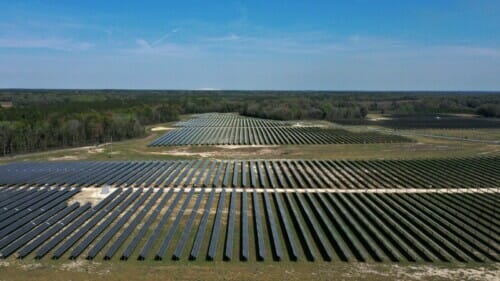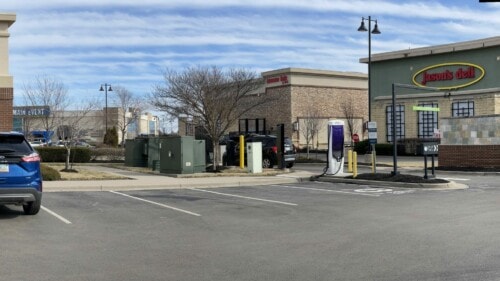Kansas City Tapping Massive Vein of Sustainability Funding Up to $200 Million at Stake
Published January 9th, 2024 at 8:44 AM
Above image credit: Clouds against a blue sky. (File photo)The Kansas City area, which is emerging as a national sustainability hub, is preparing for a windfall of federal funds to get even greener.
The sums are so sizable – up to $200 million over five years – that even climate change skeptics may be surprised by the coming surge of bike lanes, tree plantings, green transportation corridors and more energy-efficient housing and buildings.
By the time this pot of federal honey gets spooned out locally, soccer fans from around the world will be headed to Arrowhead Stadium for the 2026 FIFA World Cup matches. They will marvel at a host of green projects in the works to meet the requirements of the event backers.
As soccer fans gather for the World Cup, the largest municipally pushed solar power farm in the nation is likely to be humming at the newly refurbished Kansas City International Airport. Panasonic will also be operating at its new $4 billion electric vehicle battery plant in De Soto, Kansas.
So, what fresh sustainability funds are now tantalizing local officials?
The Biden administration and Congress recently passed the Bipartisan Infrastructure Law and Inflation Reduction Act to get the economy moving again after the COVID recession and reinvigorate America’s manufacturing muscle.
The spending will funnel unprecedented levels of support into renewables, energy efficiency, EV charging stations and other strategies that will reduce greenhouse gas emissions that accelerate global warming.
The MId-America Regional Council (MARC) and its nine area counties and 119 cities in Missouri and Kansas for months have been devising and prioritizing plans worthy of funding from a total of between $50 million and $200 million for Kansas City carved from the Inflation Reduction Act. The program, administered by the U.S. Environmental Protection Agency (EPA), amounts to $4.6 billion nationally.
Tom Jacobs, MARC chief resilience officer, said the agency has been working with local governments and stakeholders to identify resilience projects worthy of support. Many of those projects were submitted to meet a Dec. 15 internal deadline and are now being reviewed.
Jacobs declined to specify in any details what kinds of novel sustainable efforts communities from Olathe to Parkville may be eager to fund.
“We’re dealing with extraordinarily detailed information,” he said.
“The largest portion of the funding will be dedicated to the energy efficiency of buildings – government and privately held – where the most dramatic gains of greenhouse gas emission reductions are to be achieved,” Jacobs said.
“Significant allocations are also anticipated to support transportation and urban forestry investments,” he said.
Jacobs also noted “commercial scale composting infrastructure” and “urban heat island reduction measures.”
MARC’s Climate and Environment Council in the coming weeks will recommend broad program priorities to the MARC board, which will then coordinate a vision statement and detailed description of area aspirations that will go to the EPA in April. The EPA could issue its decisions on what to support by the summer and the projects will be rolled out in the second half of the decade, Jacobs said.
Once the funding from EPA is secured, local officials will work with federal officials in fine tuning the strategy and get specific projects funded.
MARC’s council will be “taking the temperature” of the community and figuring out which projects will have both the largest impact and broadest support.
Mike Kelly, the council co-chair and chair of the Johnson County Board of Commissioners, said he and his fellow government leaders believe the time is right to fund and build out sustainability projects across the Kansas City metro region.
“This is the platform on which we were elected to serve,” he said. The goal is marrying up “environmental and economic benefits.”
What are some of the tantalizing possibilities?
“Fixed rail on Metcalf? I’m not the only one who shares that vision,” Kelly said.
Also, a new initiative is now being hammered out to deal with the mountain of area food waste that now routinely clogs landfills and spews greenhouse gases into the atmosphere. Kelly said many entities are working together to devise efforts to combat that problem locally and regionally.
“Composting projects divert huge amounts of food waste from landfills,” Kelly said. One recent report said that the carbon impact of U.S. food waste about equals that of all commercial planes flying overhead each day.
Ron Achelpohl, MARC director of transportation and environment, said that the EPA sourced funds will have broad impact helping with the buildout of “green infrastructure, resilience hubs connected by green corridors, bicycle infrastructure…”
“It’s a big deal.”
Martin Rosenberg is a Kansas City journalist and host of the Grid Talk podcast on the future of energy.




